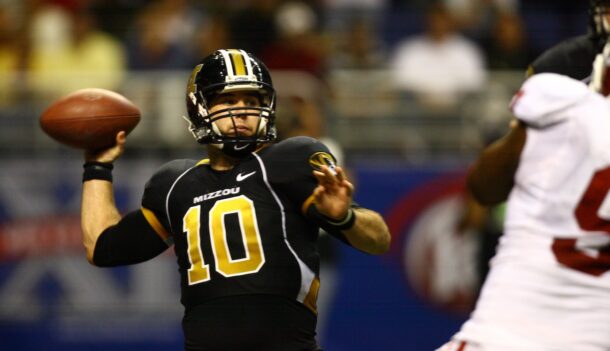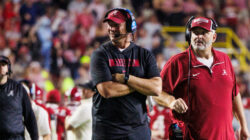Here are 20 facts you may or may not know about Georgia football:
UGA: The English Bulldog with the droopy face has been Georgia’s official live mascot, born and raised by the Seiler family in Savannah, Ga. since 1956. After a game that season, coach Wally Butts asked Sonny Seiler if he could use the dog he brought with him to the stadium as Georgia’s mascot and he obliged. Nearing the 60-year mark, nine different dogs have carried the UGA name and all have earned their respective place in Georgia football lore.
‘Between the hedges’: Since legendary Sanford Stadium opened in 1929, Georgia’s famous privet hedges have encircled the playing surface. they were removed and restored in 1996, noticeably shorter than past greenery. Chris Martin, the business manager in Georgia’s athletic department, is credited with the initial idea after enjoying the look of rose hedges lining the Rose Bowl in Pasadena, Calif.
Heisman history: Georgia’s two Heisman winners, Frank Sinkwich and Herschel Walker, received the award 40 years apart and both of their teams won SEC championships. Sinkwich was responsible for 60 career touchdowns while Walker, in three seasons, managed to set the league’s all-time career rushing record which still stands today at 5,259 yards. Sinkwich was drafted No. 1 by the Detroit Lions in 1943.
Debut of Georgia’s iconic red helmet: In 1964, Vince Dooley was credited with adopting the Bulldogs’ red helmet, replacing the previous grey leather or silver shell. Around that same time, Georgia added the Green Bay Packers’ oval G to its helmets in school colors. Interestingly enough, the Packers’ current logo is a variation of Georgia’s traditional graphic which is now trademarked.
All-Americans: Georgia’s had a ton of standout athletes come through Sanford Stadium, 68 in fact who have been named to All-American teams. Twenty-five of those players have been consensus honorees. Sinkwich, Walker and memorable defensive end David Pollack were the only multi-year All-Americans. Over the last decade, most of Georgia’s All-Americans have been on the defensive side of the football including Jarvis Jones, Bacarri Rambo and Rennie Curran.
Unclaimed vs. claimed national titles: The Bulldogs have won six national titles in their 123-year history, but only two were claimed (1942 and 1980) on the field. Need of further explanation? Before the invention of the College Football Playoff during the 1920, 1927, 1946 and 1968 seasons, Georgia was awarded mathematical titles by various outlets not recognized by the NCAA. In 1968 for example, despite a loss to Arkansas in the Sugar Bowl, the Bulldogs (8-1-2) were voted No. 1 in the final Litkenhous poll.
Goal posts: Following an upset win over Tennessee in 2000, Georgia students ripped down the goal posts at Sanford Stadium and in the process, ruined the hedges. It was the first and last time the goal posts came down in Athens for sake of the shrubs.
Deep South’s oldest rivalry: Believe it or not, Georgia has played Auburn more times — 118 — than any other team in its history, coming in ahead of Georgia Tech, Florida and Vanderbilt. With last year’s victory in Athens, the Bulldogs knotted up the series at 55-all with eight ties. Ironically, the SEC’s first overtime game was between the Bulldogs and Tigers in 1996, a four overtime affair at Jordan-Hare Stadium. Georgia won, 56-49.
10-win seasons: Mark Richt, not all-time winningest coach Vince Dooley (25 years), holds Georgia’s all-time record with nine double-digit win seasons. Dooley accomplished the feat six times including four consecutive campaigns from 1980-83.
Mercer disbands: Georgia defeated Mercer College, 50-0, in the Bulldogs’ first football game in 1892 and afterward, Mercer disbanded its team. Now, the school known as Mercer University in Macon, Ga., is recognized for a men’s basketball program that upset Duke in the 2014 NCAA Tournament second round.
Postseason 50: Georgia’s 50 bowl appearances ranks fifth-most all-time and the program’s 28 wins trails only Alabama and Southern Cal in the record books. The bulldogs have played in the Sugar Bowl nine times and the Citrus Bowl (formerly Capital One and Tangerine) on six occasions.
Glenn Scobey Warner: We all know him as ‘Pop’, the godfather of youth football and one of the early advocates of the forward pass in the 1900s. Warner won seven games Georgia’s head coach from 1895-96 and brought several innovative formations to football including the double and single wing. He was one of the game’s first coaches to draw up end-arounds and flea-flickers, using trick plays later in his career to thwart the competition. Warner was also credited with introducing shoulder and thigh pads during a dangerous era in the sport.
Recruiting dominance: Since signing class tracking became a nationwide phenomenon among various recruiting sites in 2002, Georgia has kept pace with the nation’s elite in landing the country’s top players every February. The Bulldogs have never finished outside the Top 15 and six times have landed consensus Top 5 classes.
Consecutive sellouts: From Sept. 1, 2001 to Sept. 10, 2011, the Bulldogs sold out Sanford Stadium 64 consecutive home games, a program record. According to Georgia’s 2014 media guide, the largest official home crowd in history sits at 92,746 and has been matched several times.
SEC Championship: Georgia’s won 12 conference titles, the last coming in 2005. The Bulldogs have appeared in the SEC Championship Game five times since its inception in 1992 and have two victories.
World’s Largest Outdoor Cocktail Party: The Bulldogs’ annual rivalry with Florida has been played (almost) uninterrupted at neutral site Jacksonville since 1933, but the two teams did manage a home-and-home set during the 1994 and 1995 seasons while EverBank Field was being renovated. The rivalry received its well-known moniker in the 1950s from The Florida-Times Union.
Six TDs for D.J.: SEC title-winning quarterback D.J. Shockley, in his only season as the starter, set the school record for touchdowns in a single-game (6; 5 pass, 1 rush) during a blowout win over Boise State in 2005. He accounted for three touchdowns against LSU in Atlanta that season to help the Bulldogs beat the Tigers, 34-14.
“Glory, Glory”: Georgia’s fight song has been around more than a century and is sang to the tune of “The Battle Hymn for the Republic.” Hugh Hodgson composed its current form in 1915.
Southern Intercollegiate Athletic Association: Before joining the SEC in 1932, Georgia was a member of the SIAA before an 11-year run in the Southern Conference beginning in 1921. Every member of the current SEC, except Mizzou and Arkansas, once held spots in the SIAA.
Retired numbers: Only four jerseys are retired in Bulldogs football lore — Walker’s 34, Sinkwich’s 21, Theron Sapp’s 40 and No. 62 from Charley Trippi. Trippi won the Maxwell Award in 1946 and was a consensus All-American that same season.







